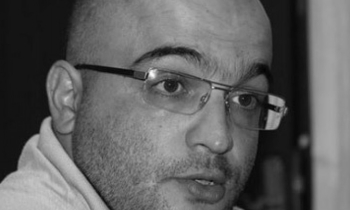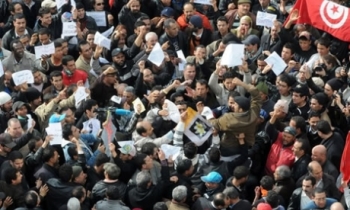Twenty-eight months after Egyptian President Hosni Mubarak promised to initiate legislations to decriminalise press offences comes a new law which does not do enough to protect journalists from prosecution for reporting stories critical of the government. The law, in fact, sharply increases fines for defamation.
The National Assembly, controlled by Mubarak's National Democratic Party, passed the bill after a last-minute intervention by the president to drop a clause stipulating jail terms for journalists who defame public officials with allegations of corruption. The amendments lift some minor restrictions on the media but still mandate prison sentences for journalists convicted of insulting the president and foreign heads of state, acording to the New York-based Committee to Protect Journalists (CPJ).
Under the law, journalists face imprisonment for publishing "false" information, defaming the president and foreign heads of state, and insulting state institutions such as parliament, the judiciary, and armed forces. Prison sentences run as high as five years. The law scraps some articles from the previous law that specified prison terms. In a highly publicised move, Mubarak, just before signing the law, cancelled a much-criticised amendment that would have stipulated jail time of up to three years for journalists who write about the financial activities of government officials.
On 23 February 2004, the Egyptian president had asked Galal Aref, secretary-general of the Egyptian Press Syndicate (EPS), to convey to the hundreds of journalist and writer members his commitment to enact legislations to end the imprisonment of journalists for press offences and bring Egypt closer to its obligation to abide by international standards for press freedom.
"The passage of this law actually represents a slight deterioration (of press freedom)," Hisham Kassem, vice-chairman of leading independent daily Al-Masry Al-Youm told Inter Press Service (IPS). Many publications have decided to disregard the legislation, he said. "Under the unified position of 25 opposition and independent newspapers, we've decided to ignore this legislation, and are prepared to suffer the consequences."

"Egyptian journalists are hardly better off today than they were before this law, said CPJ Executive Director Joel Simon. " Journalists can still be locked up for what they write, and now they are subject to more onerous fines that can be used to silence them. Egypt will need to go beyond half-measures and smoke screens if it is serious about upholding basic press freedoms."
"Even after last minutes changes were made by President Mubarak, this law falls short of full protection for journalists," said International Federation of Journalists (IFJ) General Secretary Aidan White. "The President has pledged to protect journalists but this legislation still makes it dangerous for Egyptian media to take its rightful role as a government watchdog without fear of retaliation."
On July 9, hundreds of Egyptian journalists held a strike to protest the new law. In a show of solidarity, opposition and independent newspapers and online publications did not put out their Sunday edition. Journalists turned out in a mass protest in Cairo.
"We are not saying that is not an encouraging step that President Mubarak is taking; we are just saying it's not enough," said Yahia Kalash, General Secretary of the Egyptian Journalists' Syndicate (EJS). "The problem is the way laws in Egypt criminalise journalism and prevent our colleagues from doing their jobs and deny society its right to information. We have been waiting for over 28 months and now it's time for us to push for a complete ban on jail sentencing, not just a few amendments, which are not in line with the aspirations of Egyptian journalists."
"Criticising public officials should not be a criminal offense at all, much less one punishable by prison terms," said Joe Stork, deputy director of the Middle East and North Africa division at Human Rights Watch (HRW). "President Mubarak needs to make good on the promise he made two years ago to come up with a law that protects journalists from prison, even when they criticise public officials."

Formerly, according to HRW, article 181 of the Penal Code called for the detention of "whoever vilifies . . . the king or president of a foreign country," but set no mandatory sentence. The new penalty is fixed at between six months and five years in prison, or a fine of between 5,000-20,000 Egyptian pounds ($870-3,480) for the editor and 10,000-30,000 pounds (US $1,740-5,220) for the reporter. Embassies may bring suits against Egyptian journalists by writing a letter to the Egyptian ministry of foreign affairs, which may then choose to assist them in bringing charges against the journalist.
Article 308 of the Penal Code, which imposes a minimum sentence of six months in prison on journalists whose articles "comprise an attack against the dignity and honour of individuals, or an outrage of the reputation of families," remains in force.
Article 179, which calls for the detention of "whoever affronts the president of the republic," also stays on the books, as does Article 102, which allows for the detention of "whoever deliberately diffuses news, information/data, or false or tendentious rumours, or propagates exciting publicity, if this is liable to disturb public security, spread horror among the people, or cause harm or damage to the public interest."
These vague and broadly worded provisions in Egypt's Press Law invite abuse and contravene international standards of freedom of expression, Human Rights Watch said. Under international human rights law, political leaders and other public figures must tolerate public scrutiny of their conduct and limits on freedom of expression cannot be used to protect officials from public opinion or criticism. Laws setting out criminal penalties for alleged libel have a chilling effect on the press and stifle public debate.
In 2006 alone, CPJ has documented the cases of at least three journalists sentenced to jail on defamation charges for their criticism of government officials and other influential figures. Last month, a court sentenced Ibrahim Eissa, editor of independent weekly Al-Dustour, and Sahar Zaki, a reporter for the paper, to a year in prison for insulting Mubarak. The case stemmed from an article that reported efforts by an Egyptian lawyer to take Mubarak and his family to court on allegations of corruption, including the alleged misuse of foreign aid.

In the July 12 edition of the official mouthpiece Al-Gomhouriyah, Mubarak stressed his rejection of jail sentences for journalists "despite the transgressions and incorrect behaviour that some of them commit." He was quoted as saying, "We want objective journalism based on constructive criticism, not on insults and fabrications."
Kassem expressed doubt at the sincerity of the President's intervention, and told IPS, "It was either a cheap ploy, decided on in advance, or it was simply a realisation that the passage of the new law would just be too costly politically."









